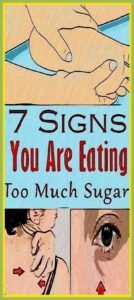7 Signs You’re Eating Too Much Sugar

Sugar, in moderation, is a perfectly fine part of a balanced diet. However, excessive sugar consumption can have a range of negative health consequences. Here are 7 signs that you might be eating too much sugar:
1. Frequent Cravings
One of the most common signs of sugar overload is frequent cravings for sweet treats. When you consume too much sugar, your body becomes accustomed to the high levels of glucose, leading to a constant desire for more. This can make it difficult to resist sugary snacks and drinks, even when you’re not physically hungry.
2. Mood Swings
Sugar can have a significant impact on your mood. When you consume too much sugar, your blood sugar levels can spike and then crash, leading to feelings of irritability, fatigue, and anxiety. This roller coaster of emotions can disrupt your daily life and make it difficult to concentrate or maintain a positive outlook.
3. Weight Gain
Excess sugar consumption is a major contributor to weight gain. When you consume more calories than you burn, your body stores the excess energy as fat. Sugar is high in calories and low in nutrients, making it easy to overeat without feeling satisfied.
4. Skin Problems
Sugar can wreak havoc on your skin. High blood sugar levels can damage collagen and elastin, leading to premature aging and wrinkles. Additionally, sugar can contribute to inflammation, which can worsen acne and other skin conditions.
5. Fatigue
While sugar may provide a temporary energy boost, it can actually lead to chronic fatigue. When your blood sugar levels spike and then crash, you may feel tired and sluggish. This can make it difficult to stay focused and productive throughout the day.
6. Increased Risk of Chronic Diseases
Excessive sugar consumption is linked to a number of chronic health conditions, including type 2 diabetes, heart disease, and certain types of cancer. By reducing your sugar intake, you can lower your risk of developing these serious health problems.
7. Difficulty Concentrating
High blood sugar levels can impair your cognitive function, making it difficult to concentrate, learn new information, and make decisions. By cutting back on sugar, you can improve your mental clarity and focus.
Tips to Reduce Sugar Intake
Here are a few tips to help you reduce your sugar intake:
- Read Food Labels: Pay attention to the sugar content of processed foods and drinks. Choose options with low added sugar.
- Limit Sugary Drinks: Avoid sugary sodas, juices, and energy drinks. Opt for water, unsweetened tea, or coffee instead.
- Eat Whole Foods: Focus on whole, unprocessed foods like fruits, vegetables, and whole grains. These foods are naturally low in sugar and provide essential nutrients.
- Cook at Home: Preparing meals at home allows you to control the amount of sugar added to your food.
- Gradually Reduce Intake: Don’t try to cut out sugar completely overnight. Gradually reduce your intake over time to avoid withdrawal symptoms.
By making simple changes to your diet, you can reduce your sugar intake and improve your overall health. Remember, moderation is key. Enjoy sweets in moderation as part of a balanced diet.
Related Posts
10 Cancer-Linked Foods You Should Never Put in Your Mouth Again Potentially Carcinogenic Foods to Avoid
